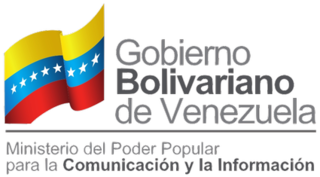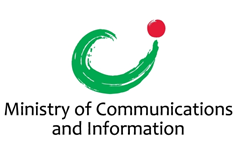 W
WThe Ministry of Communications and Information Technology (MCIT) is an organ of the government of Afghanistan. Current communications minister is Mashomeh Khavari. The Ministry was subjected to a suicide attack in 2019.
 W
WThe Ministry of Transport, Communications and High Technologies is an Azerbaijani governmental agency within the Cabinet of Azerbaijan in charge of regulation of the communications sector and development of information technologies in the country. On the 12 November 2015, the head of the ministry, Ali Abbasov has been dismissed from his post.
 W
WThe Ministry of Transportation and Communications (MOTC), is the regional executive department of the Bangsamoro Autonomous Region in Muslim Mindanao (BARMM) responsible for affairs related to communications and transportation in the region.
 W
WMinistry of Transport, Information Technology and Communications of Bulgaria is a Bulgarian government ministry, part of which are:Information Technology Directorate, concerned on policies for the development of IT in Bulgaria Electronic Government Directorate - electronic government policies in Bulgaria European Coordination and International Cooperation Directorate - European Union policies
 W
WThe Ministry of Transport and Telecommunications is a government ministry of Chile. Its head office is in Santiago.
 W
WThe Ministry of Transportation and Communications is a cabinet-level governmental body of the Republic of China (Taiwan) in charge of all policy and regulation of transportation and communications networks and administration of all transportation and communications operations and enterprises in Taiwan.
 W
WThe Egyptian Ministry of Communications and Information Technology (MCIT) is the government body responsible for information and communications technology (ICT) issues in the Arab Republic of Egypt. Established in 1999, MCIT is responsible for the planning, implementation and operation of government ICT plans and strategies. MCIT is led by the Minister of Communications and Information Technology, who is nominated by the Prime Minister and is a member of the cabinet. The current ICT Minister is Amr Talaat who assumed the position on 14 June 2018. MCIT is headquartered in Smart Village Egypt, in 6th of October, Giza Governorate, in the Cairo metropolitan area.
 W
WThe Federal Ministry of Transport and Digital Infrastructure, abbreviated BMVI, is a cabinet-level ministry of the Federal Republic of Germany. Its main office is located in Berlin, while the majority of its civil servants and employees work in Bonn, the secondary seat.
 W
WThe Ministry of Communication and Information Technology is a ministry of the government of Indonesia that is responsible for communication and information affairs. The ministry reports to the president is and led by a minister.
 W
WThe Ministry of Information and Communications Technology, or Ministry of ICT established in 1908, is responsible for postal services, telephones and information technology in the Islamic Republic of Iran.
 W
WThe Ministry of Communications of Iraq (MoC) is the federal government ministry concerned with providing basic telecommunications services to the public, government, and businesses. The MoC provides postal service to the general public and manages postal savings accounts. It also runs the State Company for Internet Services and represents Iraq at international organization such as the International Telecommunications Union (ITU) and the Universal Postal Union (IPU).
 W
WThe Department of the Environment, Climate and Communications is a department of the Government of Ireland that is responsible for the telecommunications and broadcasting sectors and regulates, protects and develops the natural resources of Ireland. The head of the department is the Minister for the Environment, Climate and Communications who is assisted by one Minister of State.
 W
WThe Ministry of Communications is the Israeli government ministry responsible for Communications in Israel. It is a relatively minor position in the cabinet. The ministry was established in 1952, and until 1970 was known as the Ministry of Postal Services.
 W
WThe Ministry of Internal Affairs and Communications is a cabinet-level ministry in the Government of Japan. Its English name was Ministry of Public Management, Home Affairs, Posts and Telecommunications (MPHPT) prior to 2004. It is housed in the 2nd Building of the Central Common Government Office at 2-1-2 Kasumigaseki in Chiyoda, Tokyo, Japan.
 W
WMinistry of Transport and Communications of the Republic of Lithuania is the main institution in Lithuania, which coordinates the work of road, rail, air, water, transport, postal and electronic communications sector and implements the strategy and politics of state government. The Ministry of Transport and Communications shall be a budgetary institution financed from the State budget of the Republic of Lithuania.
 W
WThe Ministry of Communications and Multimedia, abbreviated KKMM, is a ministry of the Government of Malaysia that is responsible for communications, multimedia, broadcasting, information, personal data protection, special affairs, media industry, film industry, domain name, postal, courier, mobile service, fixed service, broadband, digital signature, universal service, international broadcasting, content.
 W
WThe Secretariat of Communications and Transportation of Mexico is the national federal entity that regulates commercial road traffic and broadcasting. Its headquarters are in the Torre Libertad on Reforma in Mexico City but some aspects of the department still function at the old headquarters located at the intersection of Eje Central and Eje 4 Sur (Xola). The building is decorated with murals created by arranging small colored stones on the building's outer walls.
 W
WMincom is the Ministry of Communications for the Government of Morocco.
 W
WThe Ministry of Communications and Information Technology administers Myanmar's communications and information technology policies. The ministry was formerly known as the Ministry of Communications, Posts and Telegraphs.
 W
WThe Ministry of Economic Affairs and Communications is a government ministry of Estonia. Its head office is in Tallinn.
 W
WMinistry of Information Technologies and Communications, is the national executive ministry of the Government of Colombia responsible for overseeing the information and communication technologies, telecommunications and broadcasting industries in Colombia.
 W
WThe Ministry of Information, Communications, Transport and Tourism Development (MICTTD) is a government ministry of Kiribati, headquartered in Betio, South Tarawa.
 W
WThe Ministry of Popular Power for Communication and Information (Minci) is a public ministry of the Government of Venezuela dedicated to communication, informing the Venezuelan public and promoting the Venezuelan government.
 W
WThe Ministry of Posts and Telecommunications was one of the ministries in the Japanese government. Ministry was resulted as merger of Ministry of Postal Services (郵政省) and Ministry of Telecommunications (電気通信省) on 1 August 1952, which were superseding Ministry of Communications from 1 April 1946.
 W
WThe Ministry of Posts, Telecommunications and Information Technology is a Bangladeshi government ministry. It contains two divisions:Posts and Telecommunications Division Information and Communication Technology Division
 W
WMinistry of Transport and Communications is the government agency of Myanmar. The ministry is currently led by Union Minister, Thant Sin Maung.
 W
WThe Ministry of Communication and Information Technology is governmental body of Nepal that manages postal services, telecommunications, broadcasting, press and information and film development in the country.
 W
WThe Ministry of Education, Culture and Science is the Dutch Ministry responsible for education, culture, science, research, gender equality and communications. The Ministry was created in 1918 as the Ministry of Education, Arts and Sciences and had several name changes before it became the Education, Culture and Science in 1994. The Ministry is headed by the Minister of Education, Culture and Science, currently Ingrid van Engelshoven.
 W
WThe Ministry of Communications, is a Cabinet-level ministry of the Pakistani Government responsible for analysing, formulating and implementing central policy on communications and transportation. It is the one of the oldest ministries, created August 14, 1947. The Ministry of Communications has jurisdiction over telegraph and telephone communications as well as public radio, technical means of radio and television broadcasting and the distribution of periodicals. The Ministry and its political executive, the Communications Minister, are headquartered in the Cabinet Secretariat, Islamabad Capital Venue. The Communications Minister is a public appointee who must be a member of Parliament. As of 17 December 2018, the Communications Minister is Murad Saeed.
 W
WThe Department of Information and Communications Technology is the executive department of the Philippine government responsible for the planning, development and promotion of the country's information and communications technology (ICT) agenda in support of national development.
 W
WMinistry of Industry and Information Technology (MIIT) of the Chinese government, established in March 2008, is the state agency of the People's Republic of China responsible for regulation and development of the postal service, Internet, wireless, broadcasting, communications, production of electronic and information goods, software industry and the promotion of the national knowledge economy. The MIIT was also responsible for the nation's tobacco control, but this task will be assigned to a new health commission to be established as part of a broad governmental reshuffle.
 W
WPeople's Commissariat for Posts and Telegraphs of the RSFSR, known shortly as the Narkompochtel, was the central organ of government of the RSFSR that was in charge of the organisation and development of the different forms of communication, including postal service. It was founded in Petrograd on 7 November [O.S. 25 October] 1917 from the Russian Ministry of Posts and Telegraphs and retained its organisational structure.
 W
WThe Ministry of Communications and Information is a ministry of the Government of Singapore. It is in charge of information and communications technology, the media and design sectors, public libraries, as well as the Government's information and public communication policies.
 W
WThe Film and Publication Board, is a content-classification and regulation authority in South Africa, operating under the Minister of Communications. The FPB was established in 1996 under the Films and Publications Act, ostensibly to tackle issues of child pornography and child abuse, as well as to provide ratings to publicly consumed media such as movies, music and television programs. Under these directives, its mandate can be considered one of state censorship.
 W
WThe Ministry of Science and ICT is a ministry of the Government of South Korea. It succeeds former Ministry of Science, ICT and Future Planning.
 W
WThe Ministry of Science, ICT and Future Planning was a ministry of the Government of South Korea. Its purpose is to set, manage, and evaluate science and technology policy, support scientific research and development, develop human resources, conduct R&D leading to the production and consumption of Atomic power, plan national informatization and information protection strategies, manage radio frequency bands, oversee the information and communications technology (ICT) industry, and operate Korea Post. Its headquarters we in Building #4 of the Gwacheon Government Complex in Gwacheon, Gyeonggi Province.
 W
WThe Ministry of Communications of the Union of Soviet Socialist Republics (USSR) was the central state administration body on communications in the Soviet Union from 1923 to 1991. During its existence it had three names: People's Commissariat for Posts and Telegraphs (1923–32), People's Commissariat for Communications (1932–46) and Ministry of Communications (1946–1991). It had authority over the postal, telegraph and telephone communications as well as public radio, technical means of radio and television broadcasting, and the distribution of periodicals in the country.
 W
WThe People's Commissariat for Communications of the USSR was the central state agency of the Soviet Union for communications in the period 1932 to 1946. The Commissariat administered the postal, telegraph and telephone services.
 W
WPeople's Commissariat for Posts and Telegraphs of the USSR was the central organ of the Soviet Union government that was in charge of the organisation and administration of the different forms of communication including posts. It existed between 1923 and 1932.
 W
WThe Ministry of Transport and Infrastructure is a government ministry office of the Republic of Turkey, responsible for transport, information and communication services in Turkey. Its head office is in Ankara. The current minister is Adil Karaismailoğlu, in office since March 2020.